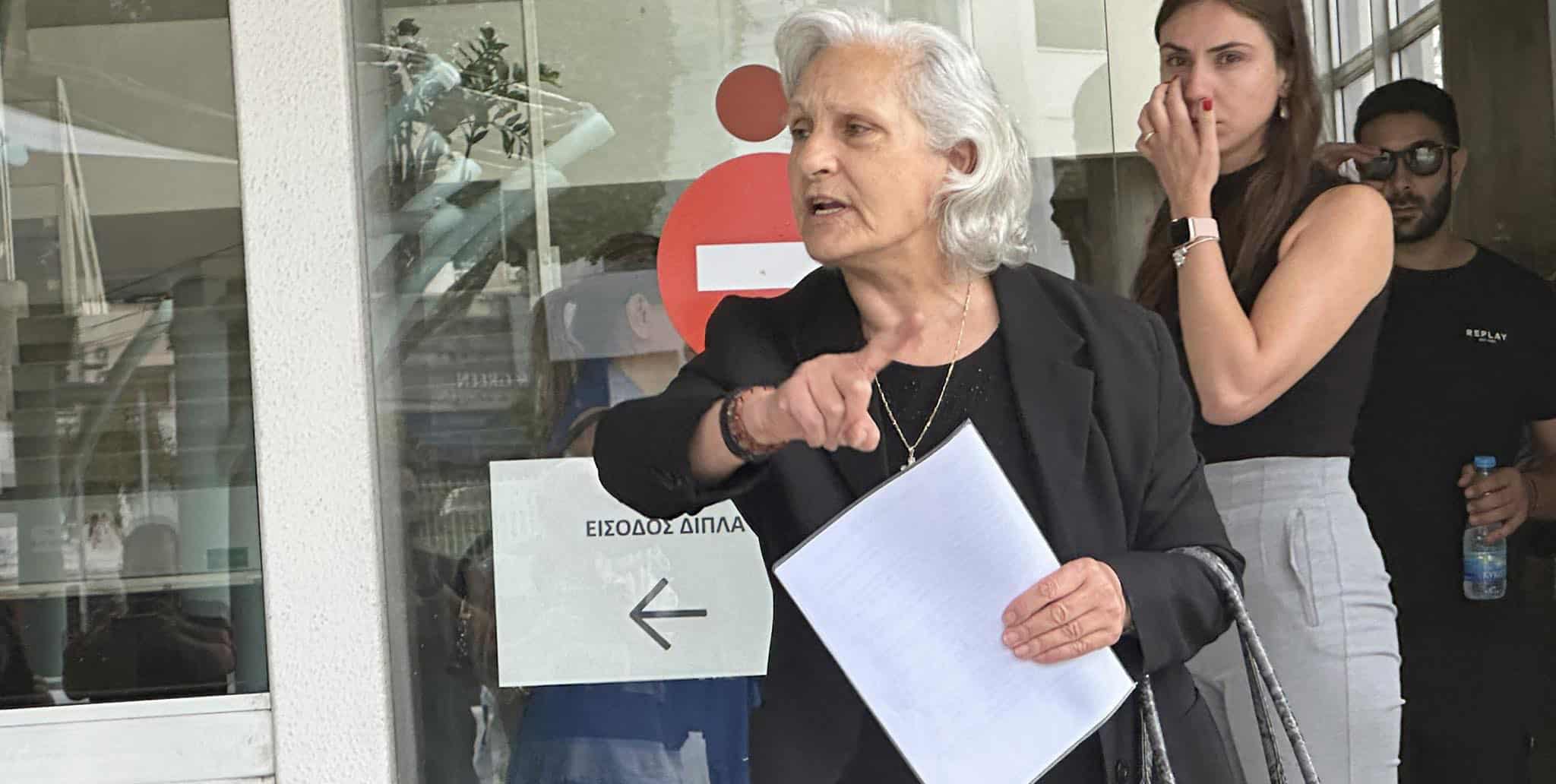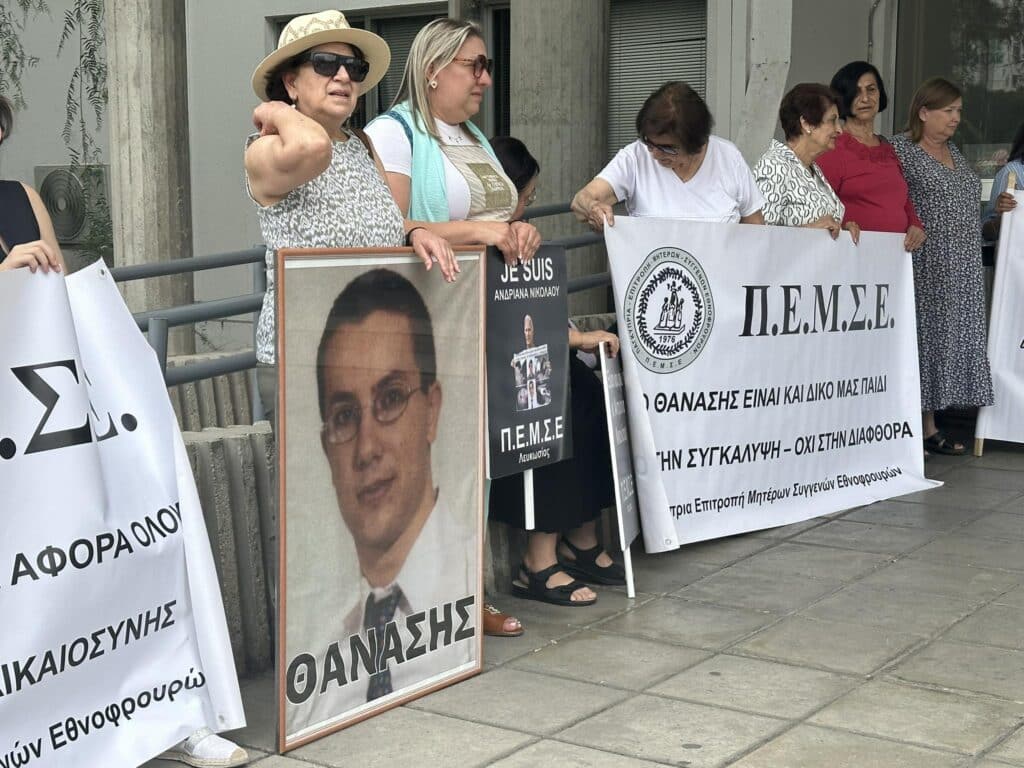By Andria Kades and Jean Christou
The death of national guardsman Thanasis Nicolaou in 2005 was a crime and he died of strangulation, rather than suicide a judge ruled on Friday. The decision has been 19 years in the making for his family, who fought to prove Nicolaou did not take his own life.
Judge Doria Varoshiotou announced her ruling in the Nicolaou inquiry to a packed courtroom as a number of demonstrators with banners gathered outside Limassol’s district court.
As she issued her verdict, the judge’s voice was shaky and she appeared emotional. Turning to Thanasis’ family to look at them directly, Varoshiotou said: “my finding is that Thanasis Nicolaou, whose body was found under the Alassa bridge, died on September 29, 2005, as a result of strangulation due to criminal activity.”
The people in the courtroom broke out in applause and tears, with some pointing at state prosecutors and yelling: “Corrupt”.
Thanasis’ family members were in tears hugging each other. “They killed my son,” the national guardsman’s mother Andriana Nicolaou said. “Light has won against the darkness”
Speaking outside the court. Andriana said justice would fall on the people who killed her son.
“I thank God for giving me the strength these years through all my sickness,” she added as she thanked the judge, the witnesses and the pathologists that helped prove it was not a suicide and did not care if people called her crazy all these years.
“For two decades we fought to prove true everyone did everything to cover up the truth,” she said.
People travelled from across the country to attend the hearing and to support the Nicolaou family, particularly Andriana, who has been at the forefront of the fight for justice over the past 19 years.
Thanasis Nicolaou was found dead under Alassa bridge in September 2005. He was 26. Forensic pathologist Panicos Stavrianos ruled it was a suicide, however the family has long-argued it was a murder coverup.
Judge Varoshiotou confirmed their suspicions on Friday when she accepted that there had been violence and fracture of Thanasis’ hyoid bone.
She also criticised the state prosecutor Xenia Xenophontos’ stance throughout the hearing, calling her line of questioning so intense it became argumentative.
The judge said the evidence found by Greek forensic pathologist Demetra Karayianni was “irrefutable”, and had ruled Thanasis died of a strangulation from a left-handed individual.
During a previous hearing, Xenophontos had accused Karayianni of “fooling” Nicolaou’s family and of hiding how much she was paid.
The judge underlined she did not understand the purpose of this line of questioning, as Karayianni was paid by the Republic in the same way that a second specialist from Greece Emmanuel Agapitou was paid – but was never asked the same question.
Varoshiotou stressed Agapitou’s findings “are not supported.”
He had suggested the injuries could happen after death and are even seen after car accidents but the judge said there was no evidence that Thanasis was a victim of a car accident
Judge Varoshiotou also said in her opinion the letter the attorney-general sent to Agapitos after receiving his findings was important.
“It seems at first glance that they raise scientific questions. But the way the questions are formulated, it appears as if they are seeking to reject Karayianni’s findings,” she said.
This was the third inquiry into the national guardsman’s death.
“Today’s decision will not bring back my son or the life I have lost,” said Andriana. “But the crime was obvious from the start, at the scene. No one can fool a mother.”
She stressed resignations won’t be enough – an entire catharsis of the system is what is needed. “Never back down when you are right. Keep insisting,” she added.
Demonstrators outside the court (Photo: Christos Theodorides)
The European Court of Human Rights has condemned Cyprus for its insufficient investigation into the case, calling it inadequate.
Thanasis’ car had been spotted at around 4pm the day he went missing. An ambulance was at the scene at 5.40pm. A doctor passing by who was off duty saw a lot of parked cars, the court heard.
He stopped, and noticed blood, that Thanasis was bruised and his mouth filled with sand. There was also sand in his hair and all over his body. He had no pulse.
At 6.30pm state pathologist Stavrianos arrived at the scene. He immediately ruled out criminal act and called it a suicide, the court heard.
The post-mortem report by Stavrianos was without a date and only submitted nine months later, the judge said. Thanasis’ wristwatch was found behind his back and had been cut off. From his wallet, his credit card was missing and was never found. Neither was his mobile phone.
Stavrianos ruled the injuries were due to a fall, suggesting the solider had jumped from the bridge.
In the ensuing days after the body was found, family members would go to the scene to inspect things for themselves. They found blood some three metres away from where he was found. The family contacted Stavrianos and he told them to tell police.
“They told her the case was closed,” the court heard.
Andriana then went to more senior police, including the deputy chief in Limassol but they refused to help.
“They told her, that’s why we have pathologists, so we don’t have to run around.”
Andriana was referred to another department, but ultimately she went herself to collect samples of the blood. Analysis showed it was human and was later confirmed to be that of Thanasis.
An army investigation was then ordered and two reports were prepared which concluded that Thanasis had committed suicide. The case was ordered into the archive.
Former investigator on the case Savvas Matsas had previously told court the case was filled with lies, omissions and that there is an ongoing conspiracy seeking to cover up the case and call it a suicide.
Matsas was removed as investigator from the case by the attorney-general, who argued it was because he revealed details of his findings to the media, something he denied.
“The reason the AG excluded me from this investigation… is because they understood I wouldn’t do whatever they want.
At the start of the third inquest, last October, the two sides had decided to continue the process from where it had stopped, that is, on the basis of the new information brought to light following exhumation and examination of Nicolaou’s bones in 2020, which led to the conclusion that his death was due to a criminal act and not a suicide.








Click here to change your cookie preferences